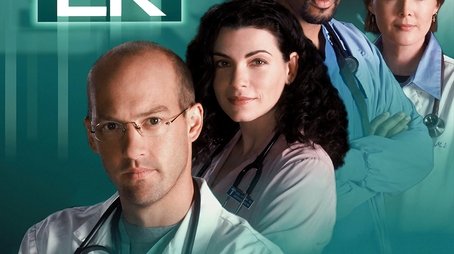
Ask Your Own Question
What is the plot?
The pilot episode of ER opens with a chaotic scene in the emergency room of Chicago's County General Hospital. Dr. Doug Ross, a pediatrician played by George Clooney, is seen flirting with a nurse while attending to a young girl who has a laceration. The atmosphere is frenetic, with doctors and nurses rushing to handle various emergencies. The audience is introduced to the main characters, including Dr. Mark Greene, the ER's chief resident, who is trying to manage the chaos while dealing with his own personal issues, including a strained relationship with his wife.
As the episode progresses, we see Dr. Greene struggling to balance his responsibilities at work with his family life. He receives a phone call from his wife, who is upset about his late hours and the lack of communication between them. This tension highlights his internal conflict as he tries to be a dedicated doctor while also being present for his family. Meanwhile, Dr. Ross continues to charm the staff and patients, showcasing his laid-back attitude, which contrasts with the more serious demeanor of Dr. Greene.
The emergency room receives a new intern, Dr. John Carter, played by Noah Wyle. He is eager but inexperienced, and his naivety is evident as he navigates the fast-paced environment. Dr. Greene takes him under his wing, providing guidance while also dealing with the pressures of the ER. Carter's first day is filled with challenges, including a traumatic case involving a gunshot victim, which tests his resolve and ability to handle the emotional weight of the job.
As the day unfolds, the ER faces a series of critical cases, including a patient suffering from a heart attack and another with a severe allergic reaction. The doctors and nurses work tirelessly, showcasing their skills and teamwork. Dr. Ross's charm is put to the test when he must confront a difficult situation involving a young mother and her child, forcing him to step up and take responsibility.
The episode also introduces the character of Nurse Carol Hathaway, played by Julianna Margulies, who is dealing with her own personal struggles. She has a complicated relationship with Dr. Ross, which adds tension to the narrative. Carol's emotional state is further complicated when she faces a crisis involving a patient who is in critical condition, leading her to make a difficult decision that impacts her professional and personal life.
As the night progresses, the ER is hit with a major trauma case: a bus accident that brings in multiple victims. The staff must work together under immense pressure, showcasing their skills and dedication. Dr. Greene takes charge, coordinating the efforts of the team while trying to keep everyone focused amidst the chaos. The emotional toll of the night weighs heavily on all the characters, revealing their vulnerabilities and the harsh realities of working in an emergency room.
In the final moments of the episode, the characters reflect on the events of the day. Dr. Greene receives a call from his wife, and they have a tense conversation that underscores the strain in their relationship. Dr. Ross and Nurse Hathaway share a moment of connection, hinting at their complicated feelings for each other. The episode ends with the staff exhausted but resolute, ready to face whatever challenges the next day will bring, encapsulating the high-stakes environment of the ER and the personal struggles of its characters.
What is the ending?
The ending of the first season of ER, which aired in 1994, culminates in a dramatic and emotional finale. The episode features a series of intense medical emergencies, personal conflicts, and character developments, particularly focusing on Dr. Doug Ross and his complicated relationship with nurse Carol Hathaway. The season concludes with a cliffhanger involving a critical patient and the emotional turmoil of the characters.
In a more detailed narrative, the final episode begins with the emergency room bustling with activity. The camera pans over the chaotic environment, capturing the urgency and tension that defines the life of the ER staff. Dr. Doug Ross, played by George Clooney, is seen treating a young boy who has been hit by a car. His determination to save the child is palpable, showcasing his deep commitment to his patients, despite his often laid-back demeanor.
As the episode progresses, we see Carol Hathaway, portrayed by Julianna Margulies, grappling with her feelings for Doug. Their relationship has been fraught with complications, and Carol is torn between her professional responsibilities and her personal emotions. In a poignant moment, she confides in her colleague, expressing her fears about their future together. The emotional weight of her words hangs in the air, revealing her vulnerability and desire for connection.
Meanwhile, Dr. Mark Greene, played by Anthony Edwards, is dealing with his own challenges. He faces a difficult decision regarding a patient who requires immediate surgery. The tension escalates as he navigates the complexities of hospital bureaucracy and the pressure from his superiors. Mark's internal struggle reflects the broader theme of the episode: the relentless demands of the medical profession and the toll it takes on personal lives.
As the night unfolds, the ER is hit with a series of traumas, including a gunshot victim and a woman in labor. Each case tests the skills and resolve of the staff, highlighting their dedication and the emotional strain they endure. The camera captures the frantic energy of the ER, with nurses and doctors working in tandem, their faces etched with concentration and concern.
In a climactic moment, Doug is faced with a critical choice when a patient's life hangs in the balance. His instincts kick in, and he makes a bold decision that ultimately saves the child he was treating earlier. This act of heroism reinforces his character's commitment to his patients, despite the personal sacrifices he has made.
The episode concludes with a powerful scene between Doug and Carol. They share a moment of connection, filled with unspoken words and lingering glances. However, the unresolved tension between them leaves viewers questioning the future of their relationship. As the camera pulls away, the chaos of the ER continues, symbolizing the ongoing challenges faced by the medical staff.
In the final moments, the screen fades to black, leaving the fate of the characters uncertain. Doug's heroic actions and Carol's emotional turmoil encapsulate the essence of the series, emphasizing the complexities of love, duty, and the relentless nature of life in the emergency room. The season ends on a cliffhanger, setting the stage for the challenges and developments that await in the next season.
Is there a post-credit scene?
The TV show ER, which premiered in 1994, does not feature post-credit scenes. The episodes typically conclude with a final scene that wraps up the storylines presented in that episode, followed by the credits. The focus is on the intense and emotional narratives of the characters within the hospital setting, and the format adheres to traditional television storytelling without the inclusion of additional scenes after the credits. Each episode is designed to leave viewers with a sense of closure or anticipation for the next installment, but there are no post-credit sequences to elaborate on or extend the story further.
What happens to Dr. Mark Greene in the series?
Dr. Mark Greene, portrayed by Anthony Edwards, is a central character throughout the series. He faces numerous challenges, including the emotional toll of working in the ER, his struggles with his marriage to Jennifer, and his relationship with his daughter, Rachel. In Season 8, he is diagnosed with a brain tumor, which leads to a poignant and emotional farewell as he comes to terms with his mortality. His final appearances show him reflecting on his life and relationships, ultimately passing away in Season 15.
How does Dr. Doug Ross's relationship with Carol Hathaway evolve?
Dr. Doug Ross, played by George Clooney, has a tumultuous relationship with nurse Carol Hathaway, portrayed by Julianna Margulies. Initially, they share a passionate romance, but their relationship is strained by Doug's commitment issues and Carol's struggles with her mental health. After a series of breakups and reconciliations, they finally find a deeper connection, culminating in a heartfelt reunion in Season 5. Their relationship is marked by emotional highs and lows, showcasing their growth as individuals and partners.
What is the significance of the character Dr. John Carter's development?
Dr. John Carter, played by Noah Wyle, starts as a medical student and evolves into a skilled physician over the course of the series. His character arc is significant as it reflects the challenges and growth of a young doctor in a high-pressure environment. He faces personal tragedies, including the loss of friends and colleagues, and struggles with his own identity and purpose. His experiences in the ER shape him into a compassionate and dedicated doctor, culminating in his eventual role as a leader within the hospital.
How does the character of Nurse Carol Hathaway deal with her mental health issues?
Nurse Carol Hathaway's character, portrayed by Julianna Margulies, grapples with significant mental health challenges, particularly in the early seasons. After a suicide attempt in Season 1, she embarks on a journey of recovery, which includes therapy and support from her colleagues. Her struggles with depression and anxiety are depicted with sensitivity, showcasing her resilience and the impact of her experiences on her relationships, particularly with Dr. Doug Ross. Carol's journey highlights the importance of mental health awareness in the demanding environment of the ER.
What are the key events surrounding Dr. Susan Lewis's character?
Dr. Susan Lewis, played by Sherry Stringfield, experiences a series of pivotal events that shape her character throughout the series. She faces the challenges of balancing her career and personal life, including her complicated relationships with her family and colleagues. Notably, her struggles with her romantic feelings for Dr. Mark Greene and her eventual decision to leave Chicago for a fresh start in Season 6 reflect her desire for personal growth. Her character is marked by her dedication to her patients and her journey towards self-acceptance.
Is this family friendly?
"ER," produced in 1994, is a medical drama that often portrays intense and realistic scenarios in a hospital setting. While it is critically acclaimed and has a strong following, it contains several elements that may not be suitable for children or sensitive viewers.
-
Graphic Medical Procedures: The show frequently depicts surgeries and emergency medical procedures in detail, which can be quite graphic and may be unsettling for younger viewers.
-
Trauma and Violence: Episodes often include scenes of trauma, such as gunshot wounds, car accidents, and other violent injuries, which can be distressing.
-
Death and Grief: The series addresses themes of mortality, with characters experiencing the loss of patients and dealing with their own grief, which can be emotionally heavy.
-
Substance Abuse: There are storylines that involve drug use and addiction, particularly among medical professionals, which may be inappropriate for younger audiences.
-
Intense Emotional Situations: Characters often face high-stress situations that lead to emotional breakdowns, conflicts, and moral dilemmas, which can be intense and may resonate deeply with sensitive viewers.
-
Adult Themes: The show includes discussions and depictions of adult relationships, including infidelity and complex romantic entanglements, which may not be suitable for children.
Overall, while "ER" is a powerful exploration of the medical field and human emotions, its content may be challenging for younger audiences or those who are sensitive to such themes.











